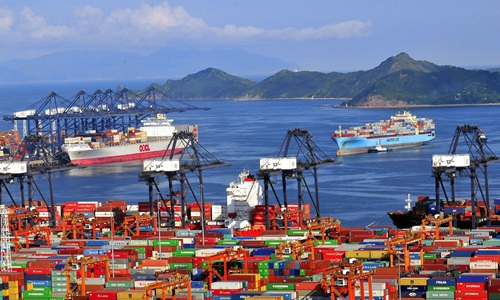HOME >> SOURCE
China-Italy trade will see double-digit decline in first half of 2020
By Qi Xijia and Xie Jun Source:Global Times Published: 2020/3/11 18:07:32

File photo
As the Italian government has locked down the whole country to contain the coronavirus, analysts predict bilateral trade between China and Italy will see double-digit decline in the first half of 2020, and bilateral investment could decline by over 30 percent.In particular, bilateral trade will be battered in the first half year of 2020 due to freezing economic activities, including difficulties in sourcing raw materials and transport disruptions.
There are more than 10,000 confirmed coronavirus cases in Italy with deal toll climbing to 631as of Tuesday, the Italian Department of Civil Protection said.
Lapo Tanzj, who manages a digital agency for a dozen Italian brands in China, told the Global Times that "made in Italy" may experience a downturn in the first and second quarters due to the virus attack. In the northern industrial Lombardy region, which was hard hit by the virus, businesses are freezing now.
Among people who were free to go to work, many refused which creates problems for the companies, he said. "Many companies have cut their orders by 50 percent. If all the companies order less the gross turnover will be cut."
He expects his business to freeze for at least one month as many Italian brands he represents are suffering in two ways: importing components from China and selling products to China.
"Last week I was talking with the CEO of a brand of baby strollers. For 3 weeks it was impossible for them to buy new wheels from China. As it was not easy to find another replacement, [the brand] was forced to suspend production," Tanzj lamented.
The same concern applies to companies in fashion and machinery industries, which are "quite scared for the lack of sourcing from China," according to Tanzj "These Italian companies used to source from China. February was a mess for them," he said.
And, exports of finished products to China have slowed down due to logistics difficulties and declining demand.
Italy on January 31 suspended flights to and from China in a bid to prevent the spread of the deadly coronavirus, forcing Italian exporters to transit their goods through other European countries.
"With less freight flights from Europe to China, the cost has leaped. Some of my clients choose to wait two to three weeks and suspended their shipping to China to lower the costs," he said.
Lorenzo Maffioli, managing direcor of Itema Weaving Machinery (China) Co, a weaving machine company focused on producing and selling weaving machines in China, told the Global Times that he expects sales in China to drop by 20 percent in the best scenario, and by 50 percent in the worst scenario.
With the coronavirus still climbing in Europe and the US, he was concerned with his customers, Maffioli said. "China's textile companies will face a reduction of their export business. And at the same time, we expect investments in new weaving machines to come down in 2020". About 80 percent of machines are manufactured at their Shanghai site and 20 percent are made in Italy and then exported to China.
He noted that though they are actually at 98 percent production capability, a recovery in sales is not expected until the third quarter.
"As for the recent updates about growing cases in Italy, France, Germany and the US, we hope the normalization of sales will occur in July or later," Maffioli said.
Italy's coronavirus outbreak has accelerated the downward trend of bilateral trade between China and Italy, Global Affairs Consultant and former EU-China Advisor to the European Parliament Song Xin told the Global Times on Tuesday.
From January to February 2020, the value of imports and exports between China and Italy totaled $6.8 billion, down by 16.2 percent year-on-year, according to data from China's General Administration of Customs.
"In the first half of this year, bilateral trade between China and Italy may see double-digit decline, while bilateral investment may decline by more than 30 percent," she said.
"For Italy, whose economic growth falls behind other EU states, it has to count on China to get out of its economic predicament. Due to the epidemic, economic exchanges between Italy and China have basically halted, which will bring losses to the Italian economy," she added.
Posted in: ECONOMY